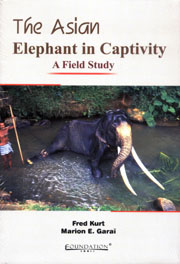Book contents
- Frontmatter
- Contents
- Preface
- Acknowledgments
- 1 Introduction
- 2 The Sri Lankan Elephant
- 3 The Captive Populations, Keeping Systems and Health
- 4 Food, Tool Use and Sleep
- 5 Musth, Reproduction, Social Integration and Stereotypy
- 6 Captive Elephants and Conservation
- 7 Base Lines and Proposals
- Appendix I
- Appendix II
- References
- Photo Gallery
- Index
7 - Base Lines and Proposals
Published online by Cambridge University Press: 05 February 2012
- Frontmatter
- Contents
- Preface
- Acknowledgments
- 1 Introduction
- 2 The Sri Lankan Elephant
- 3 The Captive Populations, Keeping Systems and Health
- 4 Food, Tool Use and Sleep
- 5 Musth, Reproduction, Social Integration and Stereotypy
- 6 Captive Elephants and Conservation
- 7 Base Lines and Proposals
- Appendix I
- Appendix II
- References
- Photo Gallery
- Index
Summary
Genesis of Social Behaviour
Most of the captive Asian elephants stem from wild populations. Certain capturing methods can be rather unselective like kheddas (the wild animals are driven in groups into an enclosure), or highly selective like mela-shikar (noosing wild elephants from the back of a hunting elephant) and immobilization. Out of 3073 wild elephants captured in khedda operations in Myanmar 8.6% were neonates and infants, 23% juveniles, 10.8% sub-adults, 30.4% adults upto an estimated age of 30 and 27.2% older adults. Selective methods like mela-shikar and immobilisation refrain from capturing neonates as well as older adults, which are either too weak, or too reluctant, for taming, training and later for work. Of 298 elephants noosed and 714 immobilized in Myanmar 21.8% and 14.7% respectively were between 4 to 5-year-old, 42.6% and 39.8% were juveniles, 15.8% and 14.7% were sub-adults, 17.3% and 19.4% were young adults and only 2.6% and 11.4% were older than 30 years. Some of these old adults had to be selectively captured because they were a threat to human lives and crops (March, 2002).
Out of 438 Asian elephants shipped to western zoos 28.5% were in their first year of life, 22.8% in their second, 13.4% in their third and 9.8% in their fourth year and only 25.3% were older (Haufellner et al., 1993, 1997, 1999), i.e. about 50% were neonates and 25% infants, when they were separated from their families and confronted with a life in captivity.
- Type
- Chapter
- Information
- The Asian Elephant in CaptivityA Field Study, pp. 240 - 289Publisher: Foundation BooksPrint publication year: 2006



